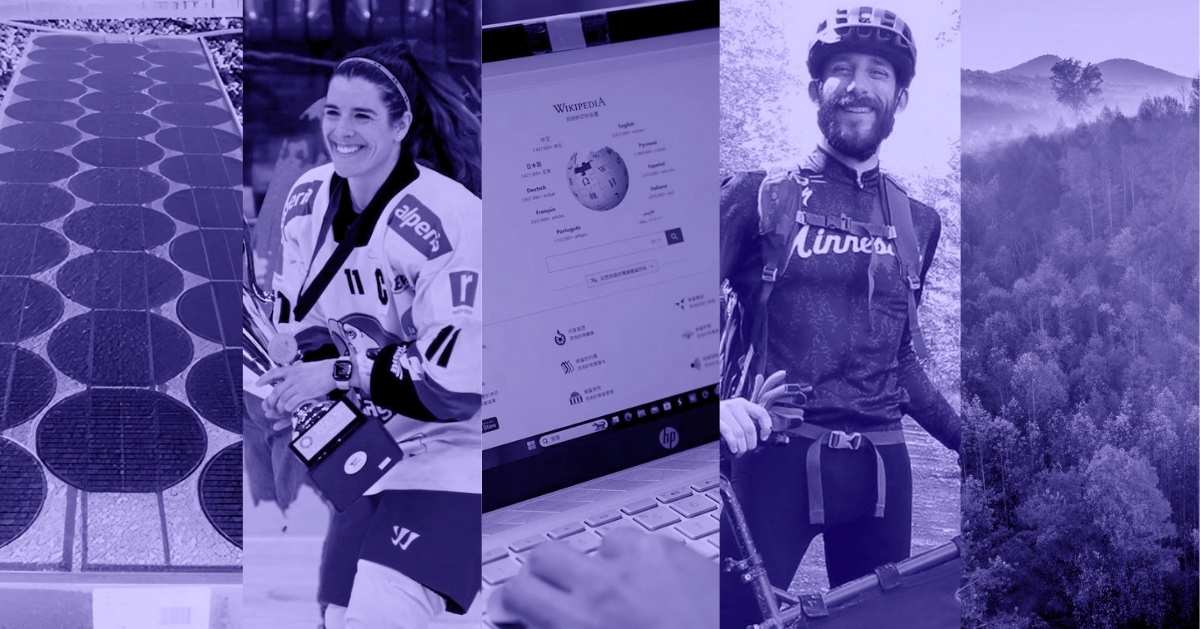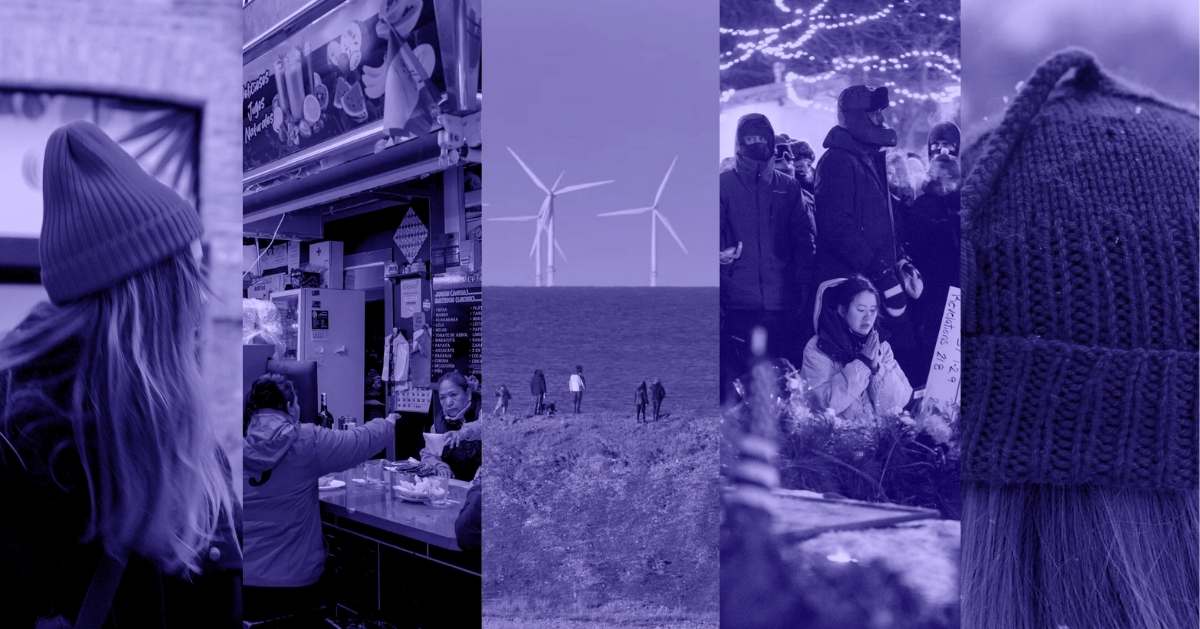Every day the Good Good Good team collects the best good news in the world and shares it with our community. Here are the highlights for this week!
If you want to get good news in your inbox every day, join the Goodnewsletter — the free daily newsletter designed to leave you feeling hopeful.
The Best Positive News We’re Celebrating This Week —
A startup in Africa is using hard-to-recycle plastic waste to build affordable housing
The recycling sector across Africa isn’t as robust as other regions in the world — just about 4% of the waste produced across the continent is salvaged, and 70 million tons of plastic end up in landfills and streets in Africa’s urban landscape every year.
Kubik, an upcycling startup in Kenya and Ethiopia, is hoping to use some of that waste for good.
By turning hard-to-recycle plastics — like polyethylene, polypropylene, and polystyrene — into affordable and low-carbon building materials, aptly called ‘plastic bricks,’ Kubik is removing about 45,000 kilograms of plastic waste from landfills every day.
Why is this good news? In addition to the environmental impact, Kubik is confronting another overwhelming reality: Africa is the fastest-growing continent in the world and needs more than 100 million new homes by 2030.
Current costs for building materials cannot meet this demand, leaving millions of Africans unhoused. Kubik’s solution also dramatically lowers this cost barrier.
Deforestation in the Amazon rainforest in Brazil is down 34% in the first half of 2023
Deforestation in Brazil’s Amazon rainforest has now fallen to its lowest level in four years — down 34% in the first six months of the year. The decline is due in large part to stronger policies from President Luiz Inacio Lula da Silva, who took office in January.
Lula promised to end deforestation entirely by 2030, and this early data from just his first six months in office is encouraging progress.
Experts note that the height of deforestation and fire season is still ahead (from July to September), and deforestation is still happening at an alarming rate — in Brazil and other countries — the amount of forest cleared in that same time is about three times the size of New York City.
Still, with stronger policies in place, this is really good progress for the country to build on.
The world’s leading ocean cleanup company just recovered a record 30 million pounds of plastic waste from waterways
Operating in 12 locations around the world, 4ocean is the global leader in cleaning up ocean plastic — and they just crossed a historic, record-setting cleanup milestone. The company officially surpassed 30 million pounds of plastic waste and man-made debris from oceans, rivers, and coastlines since they first started in 2017.
Since the 1950s, the world has produced an estimated 18.3 trillion pounds of plastic, of which less than 10% has been recycled, and 79% has accumulated in the environment.
Cleaning that up is a tall order, but it’s absolutely essential (as is reducing our plastic consumption in the first place) for the health of the planet, marine life, and humanity — and it’s one that 4ocean is committed to for the long haul.
Why is this good news? Plastic pollution doesn’t just have a devastating impact on the environment — it also impacts the global economy and food security. Seafood is a primary food source for more than 3 billion people, and ocean-based industries provide employment for billions of people and contribute trillions of dollars to the global economy every year.
Cities around the U.S. are turning old landfills into solar farms — almost 300 are completed so far
Much like the country as a whole, cities all around the U.S. have ambitious plans to reach net-zero emissions as soon as 2030. They’ll reach these goals largely by expanding their renewable energy capacity.
Running low on suitable land for solar power projects, cities are getting creative — and hundreds are putting them on land that would otherwise be unused, and in some cases, a liability: old landfills.
While the number of solar parks being built on landfills has increased in recent years, there is still huge untapped potential, industry specialists say. There are at least 10,000 disused or closed landfills across the United States — and most are publicly owned.
Why is this good news? In addition to helping cities (and the whole nation, by extension) reach its clean energy goals, these projects could also help address long-standing grievances over the location of landfill sites, which historically have tended to be built close to Black and other marginalized communities.
New research found that the renewable energy sector on track to reach net-zero emissions by 2030
A net-zero power system is closer than we think. New research published by RMI, indicates that an exponential surge in renewable energy deployment is outpacing the International Energy Agency’s most ambitious net-zero predictions for 2030.
Exponential growth in renewable energy has put the global electricity system at a tipping point. What was once seen as a wildly daunting task — transitioning away from fossil fuels — is now happening at a faster pace every year.
Based on this new research, RMI projects that solar and wind will supply over a third of all global electricity by 2030, up from about 12% today, surpassing recent calls for a tripling of total renewable energy capacity by the end of the decade.
Why is this good news? The world must dramatically and quickly reduce carbon emissions in order to avoid the most catastrophic impacts of climate change. Not only an exciting development for the health of the environment, this rapid transition to clean energy includes widespread benefits, like jobs growth, more secure supply chains, and reductions in energy price inflation.
John Green and fans achieved a breakthrough after pressuring J&J to make a life-saving tuberculosis drug available to lower income countries
When Johnson & Johnson (J&J) refused to end their patent on a life-saving tuberculosis (TB) drug, beloved author, internet personality, and passionate global health advocate John Green called on the internet to take a stand.
After thousands of people called on the pharmaceutical company to make tuberculosis treatment accessible and affordable to those who need it most, J&J announced that it would grant licensing to supply generic versions of the drug to low- and middle-income countries, in partnership with the Stop TB Partnership.
And as promised, Green and fans are celebrating this move by J&J — and calling for much-needed transparency around the decision.
Why is this good news? In addition to demonstrating the power of collective action, this will save millions of lives. Tuberculosis is the world’s deadliest infectious disease — despite the fact that it is curable. In 2021, the WHO reported 1.6 million deaths from tuberculosis.
If J&J had extended their patent for four more years, experts estimated that up to six million people would have been left without access to the life-saving drug.
A Philippines aid worker is helping restaurants, grocery stores, and entire communities reduce plastic consumption and waste
A summer trip to Danjugan Island nature reserve in 2015 opened development worker Princess Bala-an's eyes to the wonders of marine life in the Philippines island region of Negros. Around that same time, Ellen MacArthur, warned plastic waste would outweigh fish in the sea by 2050, unless people stopped polluting the ocean.
Bala-an decided to dive deep into the cause by joining the Philippine Reef and Rainforest Conservation Foundation as community manager for a project to reduce plastic waste and raise public awareness of the problem.
Her project, called Wala Usik (“nothing wasted”), supports grocery stores, entire provinces, restaurants, and even individual residents. For example, she and her team set up a one-year pilot program for “sari-sari” grocery stores, whose customers are often low-income Filipinos, to use reusable or refillable containers for common household items and to sell solid versions of liquid products.
More good news of the week —
Passengers can now book a ticket to ride on North America's first-ever hydrogen-powered train. The train will show how electricity stored as hydrogen can replace diesel fuel on railways where installing electrified rails or overhead wires would be challenging.
A bill was introduced in Congress to invest $100 million to build five tiny home villages for veterans around the country. The new tiny home villages would help house at least some of the 33,100 veterans who don’t have permanent housing.
A large new study has shown how moss both significantly improves soil quality and sequesters a lot of carbon. Mosses are one of the planet’s most common plants, found everywhere from deserts to arctic regions, but they have long been under-researched.
The first blood test that can detect preeclampsia in pregnant people was just approved by the FDA. The condition is a leading cause of maternal death and disability worldwide, impacting one in 25 pregnancies in the U.S., disproportionately among Black women.
A mining company found a massive phosphate rock deposit that could meet global demand for the next 50 years. It’s in Norway, which can also observe stricter environmental standards when extracting the minerals, including carbon capture and storage.
Dating back to World War I, the U.S. just finished destroying the last of its chemical weapons stockpile. Workers have been working for decades to eliminate the stock, which had reached more than 30,000 tons by the end of the Cold war.
Scientists at Washington University developed an air monitor that can detect Covid-19 in a room within 5 minutes. It’s a breakthrough that, when available, could be used in hospitals, schools, community living facilities, and more — and it could be adapted to detect the flu and RSV, too.
A new tuberculosis vaccine could save 8.5 million lives over the next 25 years. Tuberculosis kills one person every 20 seconds, and even though it’s treatable, around 1.6 million people each year, mostly in poor countries, die from it.
Portugal just doubled its goals for installing new solar and hydrogen capacity by 2030. The country also plans to decommission natural gas-fired power plants by 2040 and possibly become carbon neutral by 2045 — five years earlier than its original commitment.
Thanks to the loyalty of pandemic-era customers, farmers markets around the country are thriving. There are now nearly 7,000 farmers markets listed in the USDA local food directory, up from about an estimated 2,000 in 1994.
Texas banned homeowners’ associations from discriminating against renters who receive federal housing aid. The law came after a North Texas neighborhood tried to oust poorer tenants who get assistance from the federal housing choice voucher program and keep new ones from taking their place.
Arizona is now the latest state to approve over-the-counter sales of contraception at pharmacies. The new rule went into effect immediately and applies to self-administered birth control such as hormonal and oral contraceptives, improving access to contraception throughout the state.
Namibia is on track to hit targets to end the HIV/AIDS epidemic before its 2030 deadline. Namibia has one of the world’s highest HIV prevalence rates and it’s still the leading cause of death in the country, with women most impacted.
For the first time in the U.S., the FDA approved a birth control pill to be sold without a prescription. It will become the most effective form of contraception available over the counter, and help people who face hurdles in visiting a doctor to get a prescription.
Kids and teens in Colorado who visit the hospital for a mental health emergency can now receive free therapy. The initiative is spearheaded by the Follow-Up Project, which has suicide hotline staff call people who’ve been discharged from a hospital.



